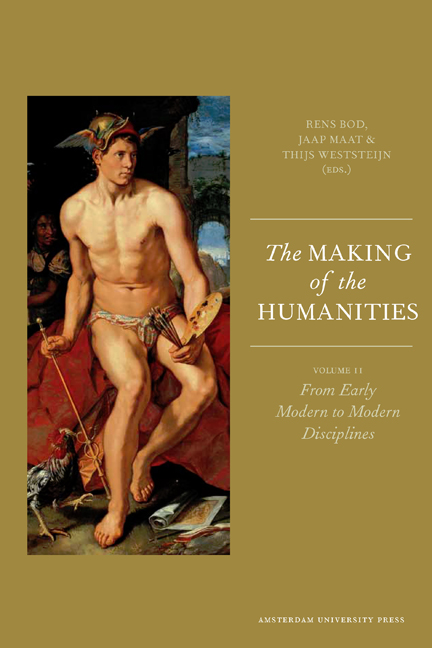Book contents
- Frontmatter
- Contents
- Introduction: The Dawn of the Modern Humanities
- I Linguistics and Philology
- II The Humanities and the Sciences
- III Writing History and Intellectual History
- IV The Impact of the East
- V Artworks and Texts
- VI Literature and Rhetoric
- VII Academic Communities
- Contributors
- List of Figures
- Index
Nineteenth-Century Historicism and Its Predecessors: Historical Experience, Historical Ontology and Historical Method
Published online by Cambridge University Press: 19 January 2021
- Frontmatter
- Contents
- Introduction: The Dawn of the Modern Humanities
- I Linguistics and Philology
- II The Humanities and the Sciences
- III Writing History and Intellectual History
- IV The Impact of the East
- V Artworks and Texts
- VI Literature and Rhetoric
- VII Academic Communities
- Contributors
- List of Figures
- Index
Summary
The term ‘historicism’ has a wide variety of meanings. Karl Popper used this word to denote the view that the course of history is determined by transparent general laws and that knowledge of these laws makes it possible to predict social developments.Popper's determinist notion of historicism is, however, highly idiosyncratic. It is more customary to use the term ‘historicism’ as a label for a specific strand of historical writing that emerged in Germany in the early nineteenth century and subsequently became a leading perspective in the academic historiography of the nineteenth and twentieth centuries, primarily in Germany, but also in other countries. It should be noted, however, that the word Historismus was not frequently used in German until the last quarter of the nineteenth century, when it gained currency in a debate on the historical relativity of values. In this debate, which continued in the first decades of the twentieth century, the historicist perspective on human culture as a fundamentally historical phenomenon became connected with the idea that human values were subject to change. For intellectuals such as Ernst Troeltsch this was a reason to speak of a ‘crisis of historicism’.
It is disputed what exactly is involved in nineteenth-century historicism, but two core aspects could be singled out. The first is the belief in the fundamental historicity of man and culture, the idea that the essence of social and cultural phenomena lies in their history. This is the ontological dimension of historicism, which involves its fundamental assumptions about the nature of the historical process and the kind of things that matter in historical reality. The second central aspect of historicism is the conviction that the study of history should be an empirical discipline, or a Wissenschaft – the English term ‘science’ is not quite applicable here, as it has a much stronger association with the natural sciences than its German equivalent. This is the methodological core of historicism, which was elaborated in a distinctive approach to historical research centred on the ideal of objectivity and the critical analysis of sources. It should be noted, though, that method and ontology are not two strictly separated domains.
- Type
- Chapter
- Information
- The Making of the HumanitiesVolume II: From Early Modern to Modern Disciplines, pp. 131 - 148Publisher: Amsterdam University PressPrint publication year: 2012



